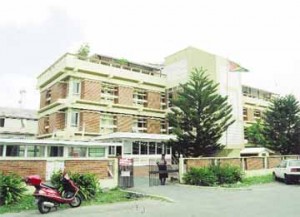More than $600m in contributions still owed
The National Insurance Scheme (NIS) could slip into a condition of crisis unless urgent steps are taken to remedy serious operational and organizational deficiencies in the running of the Scheme, according to a source close to the organization.
In a recent interview with the Stabroek Business the source said that the protracted failure to implement key recommendations contained in the report of the NIS Reform Committee which has been available for several months now has created “a kind of limbo” within the Scheme. This, according to the source, coupled with “serious management deficiencies, political direction and inadequacies at the Board level” threaten to undermine the viability of the Scheme.
“One gets the impression that the implementation of the more critical recommendations contained in the report of the Reform Committee is not on the Scheme’s front burner at this time. Some of the more critical recommendations relating to an investment direction for the Scheme and the passage of legislation to ensure a higher level of compliance must be implemented if a crisis is to be averted,” the source said.
According to the source the current global financial crisis had created “an atmosphere of extreme caution” with regard to NIS’ overseas investments. This, the source said, coupled with “the absence of any really viable local investment opportunities had meant that as far as consolidating its viability as a financial institution was concerned the NIS was “more or less, marking time.” The source added that “what this means is that the Scheme is in a state of equilibrium. What is paid out in benefits is roughly equal to what is received as contributions. There is no surplus to speak of.”
The source contends that apart from the need to identify and pursue viable investment opportunities the Scheme also needed to improve its capacity to collect contributions from delinquent employers, particularly employers and self-employed persons in the private sector as well as “capture” those who do not contribute to the Scheme.

Outstanding amounts in contributions owing to the NIS could be as high as $600m and the source said that the viability of the Scheme was dependent on its ability to ensure that those amounts are paid. “One of the issues that makes the implementation of the Reform Committee’s recommendations important is the fact that those recommendations include proposed legislation and procedural changes that would allow the NIS greater legal leverage in pursuing defaulters. Frankly, a stage has been reached where the frustrations that arise out of the available legal options have meant that the Scheme has now become less aggressive in embracing the legal option.”
And the source said that the perception among some private sector employers that “people can get away with not paying employee contributions” has made them bolder and given rise to new schemes aimed at evading employer responsibilities. This newspaper was provided with the names of local private sector institutions including businesses in the financial sector which, the source said, have been seeking to have some categories of employees re-designated self- employed in order to evade employer responsibility for the payment of employee NIS contributions. The source explained that employers are required to pay 7.8 per cent of employee salaries as NIS contributions while the employee is responsible for paying a further 5.2 per cent of salary towards NIS contributions. The source added that when persons are designated self-employed they are required to pay 11.5 per cent of their earnings in NIS contributions.
“What obtains in some cases is the employed persons are arbitrarily designated self-employed by their employers. What this means is that apart form having to pay a greater percentage of their earnings as NIS contributions those persons are no longer entitled to conditions that accrue to employees including leave with pay and uniform allowances.. Meanwhile, the employer pays nothing,” the source said.

The source told Stabroek Business that invariably “the victims of this form of employer rascality are among those who can least afford to lose their entitlements.”
And according to the source while there are clearly stipulated circumstances that constitute the condition of being self-employed under the law, cases of failure by employers to adhere to those conditions are treated “with indifference” when these are put before the Board of Directors of the NIS.
The fact that there are not far more cases of wrongful designation of employed persons as self-employed and the fact that the NIS has been able to force some employers to undo other cases of wrongful designation has been due almost entirely to the diligence of officers within the Scheme,” the source said.
The source told Stabroek Business that attempts “to deny low-waged employees the opportunity to accrue some measure of savings” under the Scheme amounted to “an exercise in double-dealing and hypocrisy by many private sector employers, some, of whom carry on endlessly about corporate social responsibility.” The source added that the various private sector organizations including the Private Sector Commission, the Guyana Manufacturing and Services Association and the Georgetown Chamber of Commerce and Industry have a duty ”to raise these issues with their members and create such pressures as they can to force them to stop these practices.”
Meanwhile, Stabroek Business has learnt that a team of consultants appointed by the Inter-American Development Bank (IDB) are currently involved in an exercise aimed at evaluating the sustainability of the Scheme’s information systems. The team, which the source said, reports to NIS Board Chairman Dr. Roger Luncheon, has been meeting with sections and departments within the Scheme to discuss issues pertaining to the operational efficiency of NIS information storage and retrieval systems.
According to the source the current regime of information management systems that obtains at the NIS was “decidedly inefficient” insofar as it “slows down retrieval of information, delays processing of claims and restricts the number of persons who can secure access at any one time.” The source explained the information system currently in use only allowed simultaneous access by around 80 NIS employees out of more than 100 employees across the country who require access every day.
Meanwhile, the source said that the Scheme continued to face serious challenges in its quest to computerize the records of its thousands of contributors. The source explained that since much of the Scheme’s written records had become defaced over time, officers had been compelled to resort to employer records where these are available. The source added that differences had arisen between the Scheme and some employers who had declined to loan those records to the NIS. “Since these are huge amounts of paper there is the question of copying costs. The other issue is the concern that has been expressed by some employers that once they release their records into the hands of the NIS those records may suffer the same fate as the NIS’ own records.”
Asked about the current status of contributor records and a possible time frame for regularizing these the source told Stabroek Business that “it is entirely conceivable that, to varying degrees, every contributor’s records may have one blemish or another.” The source said that that rectifying those blemishes could take several years.
The Board of Directors of the NIS has also come under criticism for what the source says are “sloth, a lack of vision and political heavy-handedness.”
According to the source sloth in decision-making at the Board level has become a prominent feature of the NIS. The source added that “at a time when Board members needed to be alive to investment opportunities that would help render the Scheme more buoyant it continues to include too many political appointees and too few members with the skills necessary to take the Scheme out of its present crisis.”
